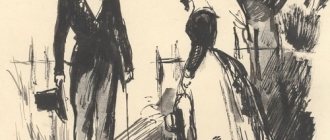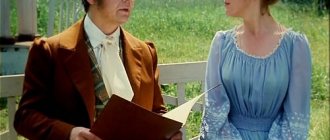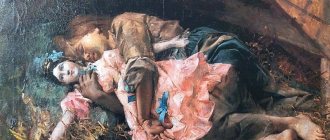Chapter 1
Luda was born in the old fading village of Vychugan. Parents were collective farmers. The father was a drunkard, and the mother, fearing that the child would be born a fool, tried to conceive him at a rare time due to her husband’s drunkenness. But the girl was born lethargic, unhealthy and tearful. Soon the father died, and it was as if both of them could breathe more freely.
Mother then had men who drank, sang, spent the night and left. And only one tractor driver from the timber industry enterprise, after having lunch, plowing the garden, and spending the night, remained to live. He helped Lyuda’s mother with the housework, even multiplying it. The girl was afraid of him, although there was no reason.
When Lyudochka finished 10th grade, her mother told her to go to the city, since there was nothing to do in the village. She arrived there by train and spent the first night at the station. In the morning I went to the hairdresser, got myself in order: painted my nails, got a perm. She wanted to dye it, but the hairdresser refused to spoil her soft hair. So she spent the whole day there running errands: dispensing soap, handing out a napkin, sweeping up someone’s hair. And in the evening she asked to become a student of the old woman Gavrilovna, who advised against wearing makeup. She agreed and even took Lyudochka with her until she learned how to cut hair, and then she would go to the hostel. The old woman had bitter experience in dealing with residents and made a rare exception for her new friend. The heroine was not spoiled by the city, she was obedient, and in her old age Gavrilovna needed someone who would bring water and help with the housework.
Teaching was not easy for the girl, and Lyudochka could only become a cleaner. But she did not give up and continued to master the business: she did shaped haircuts for girls from discos at home and did not charge for it. Sensing the weakness of the guest’s character, Gavrilovna asked her to do all the housework. Even smear your feet. For this, the old woman promised Lyudochka a residence permit, and then completely transferred her house to her.
Summary
The author states in the introduction that he heard this story about 15 years ago. He doesn’t know the girl’s name and has never seen her, but for some reason he thinks that her name was Lyudochka.
Lyudochka was born into a poor peasant family. Her father was a drunkard and “rewarded” his daughter with poor health. The girl was often sick, cried a lot, was shy and uncommunicative.
Lyudochka's father soon abandoned her mother and disappeared forever. Men began to often come to the house and stay overnight. One of them became attached to a lonely woman and began to live with her. The girl was afraid of her stepfather, although he never did anything bad to her.
When Lyudochka graduated from ten classes, her mother ordered her to go to the city (railroad village): the girl had nothing more to do in a remote village. First of all, Lyudochka went to the city hairdresser. Having done her hair, she herself offered to help with the work: sweep, serve something. In the evening, the girl asked one hairdresser (Gavrilovna) to become her student.
Gavrilovna, after thinking a little and checking Lyudochka’s documents, registered her for a job and even allowed her to live in her house. The elderly woman only gave the girl strict instructions: not to bring boys around, not to smoke, not to drink, etc. Having once sheltered two cheeky girls, Gavrilovna forever swore off letting such girls into the house. Lyudochka had not yet been “spoiled” by city life and therefore became an “exception to the rule.”
Training in hairdressing was difficult for a village girl. As a result, she was unable to pass the master's exam and remained working in a hairdresser as a cleaner. Still, Lyudochka did not give up trying to improve her skills. In her free time, she happily cut everyone’s hair for free.
Gavrilovna was supposed to retire in a year. Gradually, she transferred all household chores onto Lyudochka’s shoulders, promising to register the girl in her house for this. Gavrilovna hoped to ease her old age in this way.
Lyudochka’s daily route from the tram stop to Gavrilovna’s house went through one of the main “attractions” of the city - the train depot park. A ditch was dug through the entire park, providing a foul-smelling place for dumping a variety of waste. In the ditch there was a pipe through which hot water usually flowed.
In the evenings, city residents often “relaxed” in the park: they drank, played cards, and made love. This place was especially popular among the city punks, whose informal leader was Artemka-soap.
Lyudochka often cut Artemka's hair, but could not tidy up his thick hair. The bully was not upset by this. He continued to walk around wearing the girl and during the haircut he constantly tried to “grope” her. At first, Lyudochka simply tried to dodge the annoying gentleman, but one day she hit him hard on the head with a typewriter. After this incident, Artemka calmed down and even took the girl under his “protection”, forbidding all the punks to touch her.
Chapter 2
Luda constantly walked past the disfigured park, through which a pipe passed, destroying the local ecology with its influence. A hot, muddy liquid flowed out of it and filled the park. Sick and stunted poplars grew there, and other trees completely withered. After steam locomotives were replaced by diesel locomotives, the pipe became clogged, and everything around was overgrown with bad woods. The park began to look as if it had been bombed. The local punks, led by Artemka (nickname - Soap), lived and rampaged there. He came to Luda for a haircut: as soon as her hands were occupied by scissors, he started touching the girl everywhere until he got hit on the head with the clipper until it bled. He stopped the harassment himself, but told his comrades not to touch the girl.
Now Lyuda could walk through the park at any time, answering the punks’ greeting with her smile. After a while, Artemka invited her to dance in the pen that stood in the park. The girl immediately hid in a corner; madness reigned in the pen. Lyudochka never found her beau, and then she ran away completely, somehow fighting off some impudent person. Gavrilovna said that there is no need to rush into this, because the girl has a good future, and she needs a worthy gentleman. Dancing is a beastly sport, and many girls have been spoiled there, so you shouldn’t go there anymore. The student agreed. During this time, Gavrilovna gained respect for her, because the guest constantly kept the house clean, and, despite her severe weakness, she only thought that if she got married, she would be able to do everything.
Chapter 3
At that time, a man nicknamed Strekach returned from prison. He really had an external and internal resemblance to an insect: he smiled with a grin, his teeth were damaged, and instead of a mustache there was a “dirty mark” on his face. He was a criminal since childhood: he walked around with a knife and forced local children to give him everything they had. Already as a teenager, he received his first sentence for numerous offenses: arson, robbery, threats, etc. Since then, I came back from the camps “as if on vacation.”
Returning home, he sat with the punks in the park and demanded that they find him a woman. But the first person he saw was Lyudochka. Artemka-soap tried to push the leader away from the girl, but Strekach did not listen. He raped the victim and only stopped when she vomited on him. In order not to be the only culprit, he also forced the others to “get dirty.” Having reached the house, she fell on the steps and lost consciousness. The girl woke up already on the bed and asked to go to her mother. Gavrilovna tried to convince her that what happened was the norm, and all women are born for this.
Baba needs to take care of her heart, everything else about her doesn’t wear out...
Chapter 4
Arriving in the village of Vychugan, Lyudochka saw that there were only two houses left where there was life. The house of her mother and the old woman Vychuganikha. The rest of the houses had long been abandoned, as evidenced by the poplar and bird cherry trees growing right in the middle of the huts and the windows boarded up with boards. When Lyudochka just finished school, the old apple tree produced a large harvest of red apples, which alerted Vychuganikha. She forbade touching these apples, anticipating evil. One night the branch could not bear the weight of the fruit and broke off. The bare and flat trunk, like a cross, remained standing behind the houses, personifying the death of another Russian village. Soon the old woman died, the tractor drivers took her to the cemetery, and Lyudochka’s mother collected what she had on the table to remember.
Already pregnant from her stepfather, the heroine’s mother, with her feminine instinct, immediately understood what had happened to her daughter, but did not console her, because
But that misfortune is not a misfortune, rather an inevitability; all women must go through it sooner or later. And every woman goes through it alone and is obliged to cope with the misfortune herself, because the birch tree bends at the first wind, but does not break.
Over the years of living with her drunkard husband, she became bitter and thought that everyone should cope with their own misfortune. She communicated coldly and distantly with her daughter, all the time turning the topic to her plans with her new husband.
Until Lyudochka's stepfather returned from work, her mother sent her to milk the cow and bring firewood, and she herself went to prepare the stew. She offered to drink, but her daughter said that she had never learned to drink or cut a haircut. “But it’s not the Gods who burn the pots,” the mother simply answered.
While milking, Luda remembered how ridiculously her stepfather bathed. When she arrived, she told her mother about this, and then she learned that the man had been in the camps all his life, but the mother passionately justified her choice, because her stepfather was a “decent man.” Remembering this, the girl thought that he could console her, but she could not overcome her embarrassment and tell the man about her misfortune. Moreover, he was very reserved. As a result, she decided to leave early in the morning, to which her mother did not object.
Lyudochka summary
Astafiev created the story “Lyudochka” in 1987.
The work is written within the framework of village prose (a trend in Russian literature). Depicting all the horrors of the city, Astafiev does not idealize the village itself, showing the moral decline of the peasants. On our website you can read online a summary of “Lyudochka” .
Main characters
Other characters
Strekach is a criminal and has been in prison more than once. Artemka-soap was the “leader” among the “punks” in the park. Gavrilovna is an elderly woman, a hairdresser, with whom Lyudochka lived. Lyudochka’s mother is a 45-year-old woman; I was used to dealing with everything myself, so I ignored my daughter’s troubles.
Summary
The narrator heard this story “about fifteen years ago.” Lyudochka was born in the village of Vychugan and “grew like withered roadside grass.” The girl's father disappeared long ago. Mother soon began to live with the tractor driver. After finishing ten classes, Lyudochka left for the city. After spending the night at the station, the girl went to the hairdresser. There she met the old hairdresser Gavrilovna and asked to become her student. Gavrilovna allowed Lyudochka to stay with her, transferring housework to the girl. Lyudochka never learned to become a hairdresser, so she worked part-time as a cleaner in a hairdressing salon.
The girl got from work through the semi-abandoned park of the carriage and locomotive depot - "Vepeverze". In the center of the park there was a ditch filled with sewage overgrown with dense thickets, in which garbage was floating. The park was the favorite place of the “punks”, among whom the main one was Artemka-soap. Once, when a guy pestered Lyudochka during a haircut, she hit him hard. After that, Artemka forbade everyone from pestering the girl. One day Artemka took Lyudochka to a disco. “In the menagerie pen, people behaved like animals.” Frightened by the noise and “bodily shame,” Lyudochka ran home.
Lyudochka went home. There are two houses left in her native village - one of her mother, and the second of the old woman Vychuganikha, who died in the spring. Lyudochka was met by her pregnant mother. She immediately realized “what trouble had happened to her.” “But all women must go through that misfortune, sooner or later.” While walking by the river, Lyudochka saw her stepfather splashing around like a child. The girl guessed that he had no childhood. She wanted to cry to him, maybe he would take pity on her. In the morning Lyudochka returned to the village.
Lyudochka was buried in the city cemetery. The funeral was held at Gavrilovna's. After drinking vodka, Lyudochka’s stepfather went to the park, where Strekach’s company was located at that time. The man tore off the criminal’s cross and, dragging him into the “impassable weeds,” threw him into the gutter. “The guys felt a real, unimaginative godfather.” Artemka-soap soon went to school and got married. The death of Lyudochka and Strekach was not even written about in the local newspaper, so as “not to spoil the positive percentage with dubious data.”
Conclusion In the story “Lyudochka,” Viktor Astafiev reflects on the philosophical issues of loneliness in a crowd, people’s indifference to each other, touches on environmental problems, crime, and the moral decline of society. We advise you not to stop at a brief retelling of “Lyudochka” , but to evaluate the story in full.
Source
Chapter 5
But Gavrilovna was not expecting her so early. The girl explained that even without her, her parents were busy with the hassle of moving. In her heart she justified her mother, because she remembered how hard life was for her with a drunkard and in poverty. She put her foot through the loop and rocked the cradle while she did her household chores. Remembering this, the heroine cried - she felt sorry for her mother. And the old woman complained that there was no one to feel sorry for her.
Gavrilovna said that Artemka-soap was taken to the police and told him to remain silent about his accomplices, otherwise they would kill him. Strekach told her that if Lyudochka said too much, she would be nailed to a post, and the old woman’s hut would be burned down. And this is her last corner. Gavrilovna suggested that Lyudochka live in the hostel for a while, and when Strekach was sent to prison again, she would call the girl back.
The old woman said that she got a hut through hard work, lied, went to prisons, got sick with frequency and lichen, and now she feels sorry for her corner.
Chapter 6
Luda then remembered how she was in the hospital with pneumonia. There she saw a guy who was dying due to the fault of doctors, alone in the corridor. The doctors did not recognize the trouble in his case, but meanwhile a boil ripened on his head, and pus broke into the brain. Then she herself consoled the guy in the last minutes of his life. All night she read poems and prayers to him. The next morning he turned away, realizing that she had to live, but he no longer had to live. He cried, realizing that everyone wanted him dead so as not to suffer themselves. Now, when she was inconsolable and in grief, all the rejection of a dying person was especially acutely felt.
She had the misfortune of learning the crafty human sympathy herself. But she didn’t understand why she pretended to feel sorry for him then; a feeling of shame overwhelmed her. After all, if she were ready to stay with him, to take away all his pain and torment, as before, perhaps frantic forces would appear in him that could lift a person from his knees at death. But, even if this miracle had not happened, the realization that she was “ready to give him all of herself, until her last breath,” would have given her new strength. She betrayed not only the young lumberjack, but also herself. Lyudochka thought about her stepfather, he must be one of those strong ones. Then I thought, is it even possible to judge people for indifference to oneself? In trouble and loneliness, everyone is equal, and there is nothing to shame or despise anyone.
“Lyudochka” - a summary of the story by V.P. Astafieva
Each Russian classic chose his own direction in literature. But most often it was focused on describing the life that the author constantly saw in front of him. This is the case with the work “Lyudochka” by V. Astafiev. From its brief content one can understand that the writer tells readers about rural existence, meanness, betrayal and base human instincts.
Chapter 7
There were still no places in the hostel, so Lyudochka lived with Gavrilovna. The old woman tried to teach the girl to return home by other means, so that none of the punks would know about her living in the village. Contrary to Gavrilovna’s persuasion, she walked through the park, where the guys grabbed her. The heroine realized that her offender was not among them. She was sorry, because she carried a razor in her pocket in case of a meeting. I wanted to cut off the weapon of his crime. To gain time, she said that she would go change clothes, otherwise she was sorry for the dress that the rapists had already ruined that time. The guys believed her and ridiculed her on her way.
At home, she changed into an old village dress, took a rope, wrote a farewell letter, went out and went to the poplar that had been noticed for a long time. On the way, I saw an advertisement for employment in forestry, I thought about leaving, but I remembered:
There, in the forest, there is a strekach on a strekach, and everyone has a mustache.
Having reached the place, she deftly fitted a noose. This quiet girl could do a lot. Her last thoughts were about forgiveness: she asked God and her family to forgive her. Then I thought about God:
If you exist, forgive me, I lost my Komsomol badge anyway, no one asked about the badge. No one asked about anything - no one cared about me...
Summary – Lyudochka – Astafiev
V. Astafiev - story “Lyudochka”. In this story, the author presents us with the tragic story of a village girl. The story is preceded by an epigraph and an introduction. The epigraph is poetic; in the introduction we read Pushkin’s lines: “What’s in your name?” The introduction is filled with the author’s questions: “Why do I remember this? Why does this story, quietly and separately from everything, live in me and burn my heart? And the writer immediately gives the answer: “Maybe the whole point is in its depressing ordinariness, in its disarming simplicity?”
And then he unfolds before the reader this simple story about a village girl, seemingly indistinguishable from those around her, ordinary, modest, reserved, hardworking like a peasant. She lives in the village with her mother and stepfather. Having completed his tenth year, he leaves for the village of VPVRZ, where he goes to work at a local hairdresser. She rents a room from Gavrilovna, who sheltered her.
Astafiev’s story about the heroine’s life in this village is preceded by a description of the city park. And everywhere here we see desolation, ruin, man’s mockery of nature. A ditch has been dug in the park, through which hot mud and fuel oil flows. There are “bad forests” and “bad grasses” all around: crooked bird cherry, elderberry, and wolfberry grow. The place is completely cluttered by humans: bottles, garbage, broken benches everywhere. This terrible picture is contrasted with the slogans hanging in this place: “Leninism lives and wins!”, “Glory to the Soviet people, the victorious people!” So the writer, using the technique of contrast, talks about the huge distance between the plans of the state and real life. Both in the village of Vychugan and in the village there is devastation, drunkenness, poverty, and moral degradation of society everywhere. With great irony, even sarcasm, the writer notes that under these slogans in the park, local residents drank, played cards, fought and cut themselves to death, and “killed girls.” This is how Astafiev describes the dancing in this park: “In the menagerie-enclosure, people behaved like animals,” “The herd went wild, went berserk, creating bodily shame and delirium out of the dances.”
Characteristic behavior also distinguishes the inhabitants of this village. Here is Artemka-soap, a representative of the local punks, here is the godfather and thief Strekach, a man capable of any meanness and vileness. It is he who attacks Lyudochka one evening when she returns home through the park. And he does this out of boredom, wanting to show off in front of his friends. Astafiev expresses his attitude towards this character in the author’s comments - caustic and sarcastic, in a contemptuous intonation. There is nothing human in this hero, he is a vile and primitive type. Having become a victim of violence, the heroine has a hard time experiencing what happened. She is trying to find support from Gavrilovna, in her own family. However, everyone remains indifferent to her grief. At these moments, Lyudochka remembers the lumberjack guy who died in the hospital, that she could not help him in any way, share his fate, and feels acute guilt towards him. Strong and deep feelings live in the simple soul of this girl.
After everything that happened, Lyudochka experiences a deep feeling of guilt, shame, despair, and loneliness. “Nobody asked anything - no one cares about me!” - she thinks. And she decides to commit suicide by hanging herself from a tree. The author’s bitter exclamation seems to continue the thoughts of his heroine: “And the soul? But who needs her, that simple soul huddled in simple, ordinary flesh?”
The girl's suicide causes mixed reactions from others. Relatives experience an acute sense of guilt, Lyudochka’s stepfather deals with Strekach. In the village everything remains the same. Astafiev notes: “The oppressed, robbed, scratched, cut, beaten, living in fear of misfortunes, the inhabitants of the railway village will now breathe a sigh of relief and will live more or less well until the coming of the new Strekach, generated and raised by them.” With bitterness, Astafiev peers into the souls of his heroes and understands that this “dark kingdom” has destroyed an innocent soul.
What are the origins of these troubles? According to the writer, the root of this evil is in the severing of the people’s ties with their history, in the death of the Russian village, in the destructive social policy, when the state does not care about a specific person. In the souls of the heroes there is no faith in God, but there are no other ideals.
Astafiev writes with bitterness about the morals of the Russian people, preoccupied with the construction of socialism and communism, when human life is devalued, when all moral foundations are crumbling, everything that has been the life of the Russian people from time immemorial.
Chapter 9
Lyudochka was buried in the city cemetery. The mother either restrained herself, serving those who came, swallowing salty tears, or cried out. Gavrilovna did not hold back at all. She cried as if she had lost her own daughter, not hiding how accustomed she was to Lyudochka. After drinking a glass of vodka, the man “went to smoke” and went to the park. There I came across Strekach’s expanding company.
He saw him, at first he spoke calmly, then he became rude in prison slang, and, of course, Strekach reached for a knife. But the stepfather knocked out the Finn along with a piece of fabric. As a result, a strong man, seasoned by work, quickly overpowered the criminal and threw him into the boiling mess of the river under the pipe. The criminal howled and was scalded. His punks began to pick up foreign buttons that had fallen out of the leader’s pocket. Having blocked their stepfather’s path, they suddenly went limp and let him pass, sensing a real “godfather” in him. He did not bend his back in front of his superiors, he was a real authority, and in his restrained anger one could feel real wild power.
He left and on the way chopped off the twig where Lyuda hanged herself. Arriving at Gavrilovna’s house, he drank a little vodka, but restrained himself and did not drink more. He and his wife went to the train. She could barely keep up with him, but he did everything to make her comfortable: he carried her bag, then found a seat on the train, and then sat down so that it was comfortable for her to lean on. Along the way, the mother prayed and asked God for forgiveness for not saving Lyuda. She also asked that the child be born alive.






